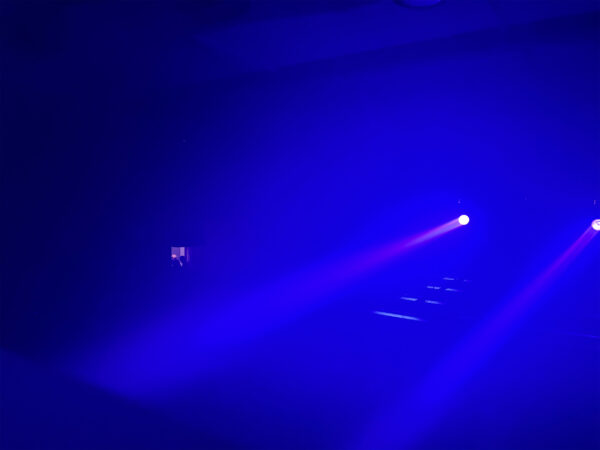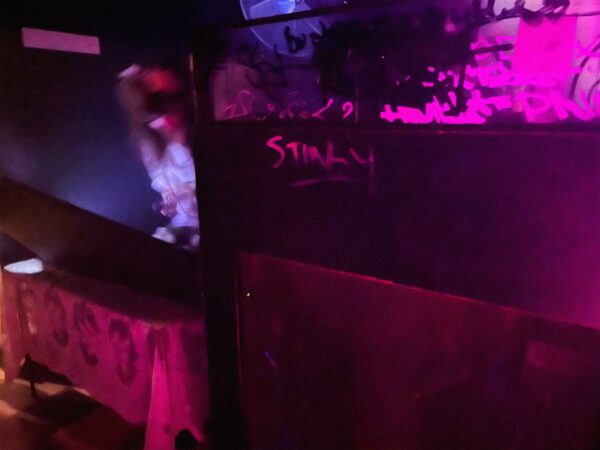In her biweekly column for Document, McKenzie Wark writes of the bewitching effects of a good DJ set—or really any art
I’d be really into karaoke if I could sing. Like, at all. Trying to hit a note is like trying to hit a nail with a hammer blindfolded. It’s not pretty. Instead, I do dramatic spoken-word renditions, but it only works on certain songs, and it has to be one nobody else wants to actually sing. I do the dramatic monologue version because I feel like I should contribute something to a karaoke group—and that something is to be more embarrassing than anyone else.
I hit on what I hoped was a good song to cover on the way to karaoke with Jenny’s work colleagues. The party had not quite started, so I was able to find it in the catalog and get it early in the queue. It was “I Put a Spell on You,” but not the Nina Simone cover. That would be way beyond my powers. I can do the Screamin’ Jay Hawkins version. Of course, I’m no Screamin’ Jay either, but imitating a great screamer is easier than a great singer.
It’s a creepy song about enchanting the object of one’s obsession into submission—a masterpiece of psychotic love. It’ll send chills down the spine of anyone who has ever been on the receiving end of unwanted attention, intense or sustained (as I have). After the greasiest sax solo of all time, Jay implores: “I love you, I love you, I love you, anyhow. I don’t care that you don’t want me, I’m yours—right now!” At the end of the song, his voice cracks into wordlessness, which you can hear as the protagonist’s final descent into madness, or as Jay letting us off the hook by turning it all into a gag.
I think my version went off okay, and in any case, the track is only two-and-a-half minutes. I passed the mic to others who could actually sing their songs. I’m thinking, though, that “I Put a Spell on You” is also about an artist’s relationship to an audience. Which might be why it’s been covered a lot. By The Animals, Creedence Clearwater Revival, Seal, Annie Lennox, Alice Smith, IZA—there’s many others. There’s even a house version by Sonique, and a techno version by Andrea Signore. Few have the deranged energy of Screamin’ Jay, although that Marilyn Manson version—oy.
“Artists cast spells of technique, charisma, taste, to try to bind audiences to them. Sometimes for the two-and-a-half minutes of a pop song, sometimes over several hours of a DJ set.”
What the artist who puts work into the world is always saying, first and last, is something like: “I don’t care that you don’t want me, I’m yours—right now!” Artists cast spells of technique, charisma, taste, to try to bind audiences to them. Sometimes for the two-and-a-half minutes of a pop song, sometimes over several hours of a DJ set.
I’m playing covers of “I Put a Spell on You” over my headphones on the way to the rave. It’s six in the morning. After karaoke, I slept for a while. Jenny wasn’t feeling up to it, so I’m on my way alone. I don’t have a ticket, which turns out to be a problem. Fonker is a rave that usually thins out by this time, but word got out that a surprise special guest is on last, so it’s packed. The bouncer turns me away. I don’t know him, so I’m getting no favors. I’m standing on the sidewalk wondering who I can text when two people come over to offer me unused tickets.
I’m really touched by this. Ravers talk a lot about “community.” Sometimes it’s worth nothing, sometimes a little, and occasionally, it’s worth a lot. In this case—just a little. But it’s the little things that make a community that can also do big things. I don’t know either of the people offering me tickets, although it seems they know me. Brandishing her phone with the red RA ticket and QR code so the bouncer can see it, N takes me through the portal to get my wrist stamped.
Fonker is a pocket rave, usually in the same Greenpoint showroom as Flocker, but with the space arranged differently. A different, constructed situation. The little details of furnishing and lighting matter. Fonker always has potted palms. The floor in this space is flat at the back, sloping in the middle, and flat at the front, which—with my club feet—rather forces the issue of where I can dance. After just a moment at the back to get my bearings, I make my way through the throng to the front.
It’s a straighter crowd than some of my other favorite parties, but this morning, everyone is here to dance. I find a niche between the speaker stack at house right and the DJ decks. I’m getting whacked a bit by what I take to be a very small Asian cis woman—but somehow I don’t mind. She’s putting out some furious energy and claiming a lot of space for it, and I just think, Go off sister!
“They’re weaving enchantment from some probably well-practiced tricks, but they’re also feeding off the dancers, gauging when to cut the spaced-out, genre-defying sonic wizardry and throw us a sonic lolly to keep us sweet. And it works. We are theirs.”
The special DJ is indeed special. There might be contractual reasons why they are not on the flier. This is not their big show in New York City. A lot of clubs insist that the touring DJs they book play nowhere else in the known universe within a time frame of several millennia of their booking, so that they have the artist as an exclusive draw. They’re counting on the name working its own little spell. I’ll just call them “Special.”
The first thing you notice about Special is confidence. An ease with the decks. They’re weaving enchantment from some probably well-practiced tricks, but they’re also feeding off the dancers, gauging when to cut the spaced-out, genre-defying sonic wizardry and throw us a sonic lolly to keep us sweet. And it works. We are theirs.
Fortunately, this is art, not love. I might be spellbound, but if I decide it’s time to quit, Special is not going to follow me, or stalk my socials. Back out on the sidewalk, chatting with strangers, turns out I’m not the only one who felt the magic. I let it hold me, maybe for longer than I might have wanted if I’d known its ruses. One can end up enraptured for hours at the rave. If you want that.
The enchantment that isn’t voluntary—if you’re an artist, a writer, a musician—is the spell the art itself puts on you. “I put a spell on you,” writing tells me. “Because you’re mine.”
“Stop the things you do,” writing commands me. I ain’t lying. Writing can’t stand my running around. It can’t stand me ever putting it down. It put a spell on me. It doesn’t care what I want. The only way out, if you’re an artist, is to share the spell with others. That’s an aesthetic community. The sharing of art and the art of sharing. We’re all bewitched together, and wouldn’t have it any other way.



















